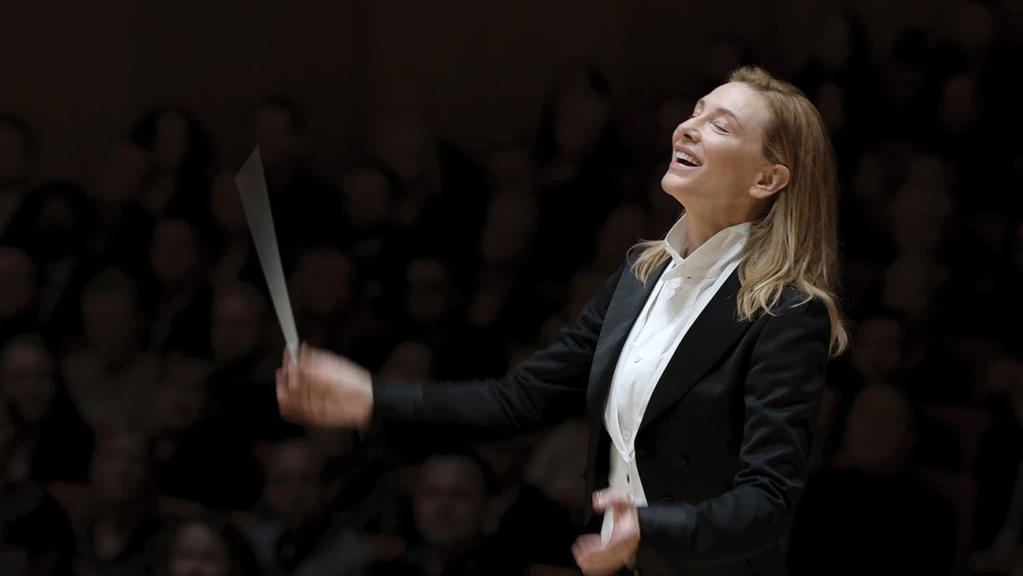Tár: A step backward for women on the podium?

Cate Blanchett in Tár. Florian Hoffmeister/Focus Features
The classical music world has been set abuzz by the 2022 psychological drama Tár. Written and directed by Todd Field and starring Cate Blanchett, the film tells the story of a fictional female conductor, Lydia Tár, who abuses her position of power for sexual favors and, ultimately, faces the consequences of her actions.
The film is at once hyperreal and surreal. Members of the Dresden Philharmonic Orchestra act and play live in the film, as does real-life cellist Sophie Krauer as the character Olga Metkina. Blanchett also does all her own piano playing and conducting while seamlessly weaving in and out of perfect German. What's more, New Yorker contributor Adam Gopnik plays himself in an interview with the Maestro, and the names of composers, musicians, and conductors at the forefront of the contemporary conversation are peppered throughout. It is all too believable—until it isn’t. No spoilers, I promise, but suffice it to say, not everything is as it seems.
Countless think-pieces have been written about the movie by musicians and non-musicians alike. Many laud Blanchett’s captivating and convincing portrayal of the title character and the unsettling suspense Field expertly builds into the film. However, Richard Brody of The New Yorker has criticized it as “a regressive film that takes bitter aim at so-called cancel culture and lampoons so-called identity politics.”
But perhaps the most justified complaint has come from Maestro Marin Alsop, to whom Lydia Tár’s résumé bears a striking resemblance. Both are female conductors who were protégées of Leonard Bernstein. Both broke gender barriers to conduct the top symphony orchestras of the world. Both teach at renowned American conservatories and run fellowships to train the next generation of female conductors. They are also both lesbians in committed relationships with instrumentalists.
The resemblance is so uncanny—and hardly coincidental—that Deanna Isaacs of the Chicago Reader writes, “I came out of a movie theater after a screening of Tár last fall wondering if there was any way Alsop could sue.”
Maestro Alsop had no part in the film and was unaware of it until shortly before it was released last fall. “So many superficial aspects of Tár seemed to align with my own personal life,” Alsop told the Sunday Times in January. “But once I saw it, I was no longer concerned. I was offended: I was offended as a woman, I was offended as a conductor, I was offended as a lesbian.”
For one, the average audience member may never have seen a woman in the role of an orchestra conductor. “To have an opportunity to portray a woman in that role and to make her an abuser—for me that was heartbreaking,” Alsop continued, particularly given that “there are so many men—actual documented men—this film could have been based on.” (See James Levine.)
But Alsop’s concerns extend beyond the field of music: “All women and all feminists should be bothered by that kind of depiction because it’s not really about women conductors, is it? It’s about women as leaders in our society. People ask, ‘Can we trust them? Can they function in that role?’ It’s the same questions whether it’s about a CEO or an NBA coach or the head of a police department.”
Though I largely loved Tár as a piece of film, the line in the film that rubbed me the wrong way was when in the interview with Adam Gopnik, Lydia Tár argues that the current generation of female conductors (naming Alsop specifically) can’t complain about gender discrimination because those who came before, such as Nadia Boulanger and Antonia Brico, had it much harder and did “the real lifting.”
While Boulanger and Brico may have faced higher barriers, that does not mean the road has been smooth for women in the field today. The profession still remains heavily male-dominated. In 2016, only 9 percent of music directors were women across 174 professional American ensembles, according to the League of American Orchestras. Maestro Nathalie Stuzman, who was appointed music director of the Atlanta Symphony this season, is now the only female music director of a top-tier American orchestra since Alsop stepped down from the Baltimore Symphony in 2021. When Alsop accepted the position at Baltimore in 2007—amid much controversy and pushback—she was the first woman to lead a top-tier American orchestra. (Loosely, "top-tier" orchestras are those that have the largest annual budgets and operate a 52-week performing season.) This means that during the 2021–22 season, there were no women at the helm of top-tier American orchestras. Maestro JoAnn Falletta is another trailblazing female conductor, having been named music director of the Virgina Symphony in 1991 and the music director of the Buffalo Philharmonic in 1999. According to her bio, her appointment with the Buffalo Philharmonic marked the first appointment of a woman to the position of music director at a major American ensemble.
So, though Tár presents a convincing portrayal of the classical music world and poses thought-provoking questions about power and the distinction between the art and the artist, one must remember it is still fiction. If you want a real glimpse into the life of a trailblazing female conductor, check out The Conductor, a riveting 2022 documentary on Maestro Alsop from PBS Great Performances, available now on the PBS Video App with PBS Passport.



